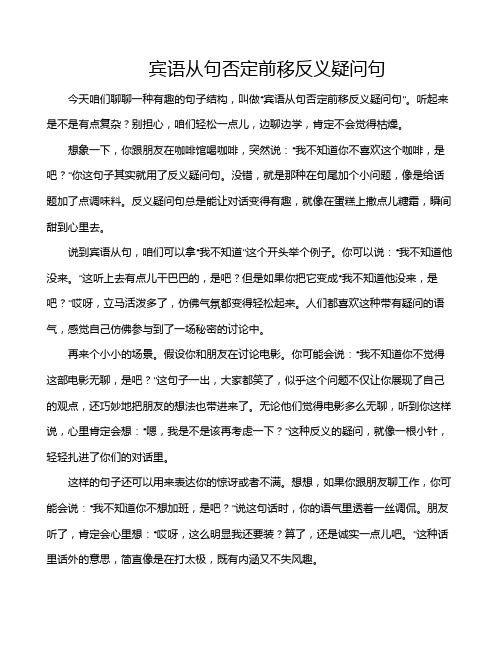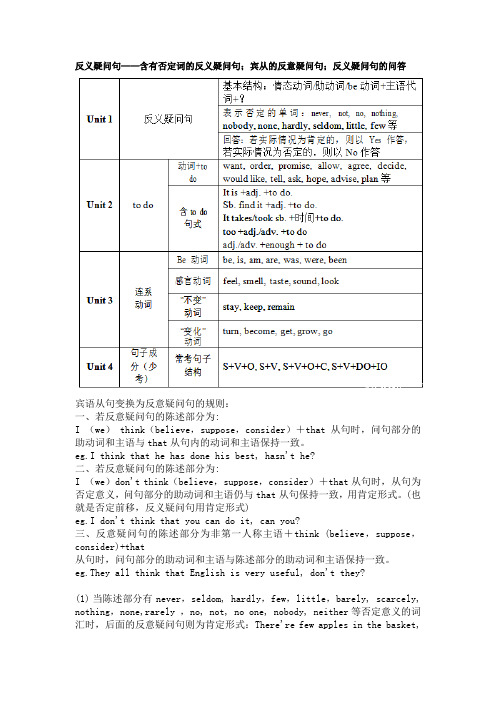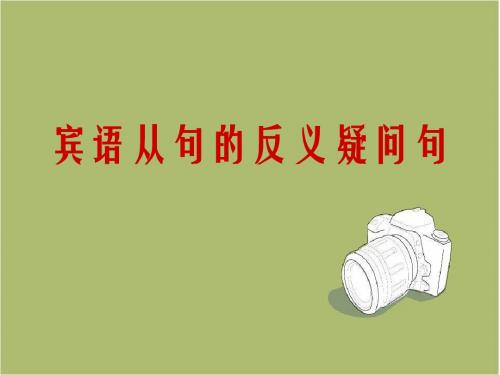宾语从句的反义疑问句.ppt
宾语从句否定前移反义疑问句

宾语从句否定前移反义疑问句今天咱们聊聊一种有趣的句子结构,叫做“宾语从句否定前移反义疑问句”。
听起来是不是有点复杂?别担心,咱们轻松一点儿,边聊边学,肯定不会觉得枯燥。
想象一下,你跟朋友在咖啡馆喝咖啡,突然说:“我不知道你不喜欢这个咖啡,是吧?”你这句子其实就用了反义疑问句。
没错,就是那种在句尾加个小问题,像是给话题加了点调味料。
反义疑问句总是能让对话变得有趣,就像在蛋糕上撒点儿糖霜,瞬间甜到心里去。
说到宾语从句,咱们可以拿“我不知道”这个开头举个例子。
你可以说:“我不知道他没来。
”这听上去有点儿干巴巴的,是吧?但是如果你把它变成“我不知道他没来,是吧?”哎呀,立马活泼多了,仿佛气氛都变得轻松起来。
人们都喜欢这种带有疑问的语气,感觉自己仿佛参与到了一场秘密的讨论中。
再来个小小的场景。
假设你和朋友在讨论电影。
你可能会说:“我不知道你不觉得这部电影无聊,是吧?”这句子一出,大家都笑了,似乎这个问题不仅让你展现了自己的观点,还巧妙地把朋友的想法也带进来了。
无论他们觉得电影多么无聊,听到你这样说,心里肯定会想:“嗯,我是不是该再考虑一下?”这种反义的疑问,就像一根小针,轻轻扎进了你们的对话里。
这样的句子还可以用来表达你的惊讶或者不满。
想想,如果你跟朋友聊工作,你可能会说:“我不知道你不想加班,是吧?”说这句话时,你的语气里透着一丝调侃。
朋友听了,肯定会心里想:“哎呀,这么明显我还要装?算了,还是诚实一点儿吧。
”这种话里话外的意思,简直像是在打太极,既有内涵又不失风趣。
而且呀,这种句子不仅仅适合朋友之间,有时候在工作中也能派上用场。
比如说,你在开会时,可以说:“我不知道大家不觉得这个方案不错,是吧?”这话一出口,气氛瞬间变得轻松,大家都知道你是在调侃,仿佛一切压力都被抛到了九霄云外。
工作嘛,忙归忙,咱们也要找乐子。
咱们得注意语气。
太认真了可就不对劲儿了,要让它听起来自然,像聊天一样。
试想,如果你一脸严肃地说:“我不知道你不喜欢这个设计,是吧?”那感觉简直像是在审问人,谁会喜欢呢?所以啊,轻松的语气,偶尔的笑声,才能让反义疑问句发挥最大的魅力。
新人教九年级英语第三单元宾语从句课件 (共44张PPT)

7. Who told you that I _w_o_u_l_d_l_e_a_v_e__ (leave) for Shanghai on Friday?
8. He said to me that Linda __w_a_s_w__a_it_in_g__ (wait) for me at the school gate at that time.
9. The teacher told us the moon __m_o_v_e_s__(move) around the earth.
10. She said Tuesday __w_a_s____ (be) the first day of the week.
11. She said January ___i_s____ (be) the first month of the year.
8. Would you tell me _w_h__y__th__e_t_r_a_i_n__is__l_a_te__?(为什么火车迟到了20 )
直接引语变间接引语与宾语从句的关系
特殊疑问句变为who, what, when等引导的宾语从句 e.g.
1. He asked me, “Where do you live?”
24
宾语从句的其他问题
1. 复合句变简单句。 1)疑问词引导的宾语从句,如果改从句与主句的主语一
致,常与疑问代词+不定式(what/when… to do) 转换,从而把宾语从句改成简单句。
14
陈述句语序
【注意下列特殊情况】 1. 当连接词做主语时,后面直接跟谓语和宾语。
e.g.: Could you tell me who broke the window ? I don’t know whose handwriting is the best in our
反义疑问句PPT

下列情况用此句式: 下列情况用此句式: 当谓语动词是否定形式时。 ①当谓语动词是否定形式时。 当陈述部分有no, never, little, ②当陈述部分有 seldom,hardly, scarcely, few, , nothing, nobody等否定或半否定词时。 等否定或半否定词时。 等否定或半否定词时
3) 关于陈述部分的主语和疑问部 分的主语一致问题
Everybody agrees with him,
don’t they/doesn’t he _______________ ? 陈述部分的主语如果是somebody, 陈述部分的主语如果是 someone, everybody, everyone, anybody, anyone, nobody, no-one, none, neither时,疑问部分 时 的主语用they或者 ,但多用 或者he,但多用they。 的主语用 或者 。Biblioteka 3) 主从复合句式反意疑问句
does he I don’t suppose he cares, _____ ? You don’t know where the meeting do you will be held, ______ ? I believe they’ve finished their haven’t they work, ________ ?
You’d better go there at instead of me___________ ? hadn’t you He’d rather not go there tomorrow________? would he He would like to go there today,_________ ? doesn’t he
反义疑问句

反义疑问句——含有否定词的反义疑问句;宾从的反意疑问句;反义疑问句的问答宾语从句变换为反意疑问句的规则:一、若反意疑问句的陈述部分为:I (we) think(believe,suppose,consider)+that从句时,问句部分的助动词和主语与that从句内的动词和主语保持一致。
eg.I think that he has done his best, hasn't he?二、若反意疑问句的陈述部分为:I (we)don't think(believe,suppose,consider)+that从句时,从句为否定意义,问句部分的助动词和主语仍与that从句保持一致,用肯定形式。
(也就是否定前移,反义疑问句用肯定形式)eg.I don't think that you can do it, can you?三、反意疑问句的陈述部分为非第一人称主语+think (believe,suppose,consider)+that从句时,问句部分的助动词和主语与陈述部分的助动词和主语保持一致。
eg.They all think that English is very useful, don't they?(1)当陈述部分有never,seldom, hardly,few,little,barely, scarcely, nothing,none,rarely ,no, not, no one, nobody, neither等否定意义的词汇时,后面的反意疑问句则为肯定形式:There're few apples in the basket,are there?He can hardly swim, can he?They seldom come late, do they?(2)当陈述部分的主语为everyone,someone,anyone,no one等表示人的不定代词时,疑问部分的主语用they或he:Everyone in your family is a teacher, aren’t they\isn't he?(3)当陈述部分的主语为everything,something,anything.nothing等表示物的不定代词时,疑问部分的主语用it:Something is wrong with your watch, isn’t it?(4)当陈述部分含有否定意思的词是unhappy,dislike,unfriendly,等含有否定词缀的派生词,也就是有un,dis,no-前缀、-less后缀等含有词缀而意思否定的词,当做肯定句处理,疑问部分要用否定形式。
宾语从句的反义疑问句怎么变

宾语从句的反义疑问句怎么变
若主语为第一人称,则对从句进行反义疑问。
I don't believe she says no,does she?若主语为第二,三人称,则对主句进行反义疑问。
He said he was wrong,didn't he?
一、若反意疑问句的陈述部分为:
I(we)think(believe,suppose,consider)+that从句时,问句部分的助动词和主语与that从句内的动词和主语保持一致。
eg.I think that he has done his best,hasn't he?
二、若反意疑问句的陈述部分为:
I(we)don't think(believe,suppose,consider)+that从句时,从句为否定意义,问句部分的助动词和主语仍与that从句保持一致,用肯定形式。
(也就是否定前移,反义疑问句用肯定形式) eg.I don't think that you can do it,can you?
三、反意疑问句的陈述部分为非第一人称主语+think(believe,suppose,consider)+that
从句时,问句部分的助动词和主语与陈述部分的助动词和主语保持一致。
eg.They all think that English is very useful,don't they?。
中考英语复习——宾语从句的反义疑问句

musician. ③He is wondering:“ What is Leo going to?” →He is wondering what Leo is going to be.
宾语从句的反义疑问句
宾语从句构成:
1.确定引导词(根据从句句式)
从句的句式
陈述句
一般疑问句
特殊疑问句
祈使句
肯定句 否定句
连接词 that
if(whether) 特殊疑问词 to+动词原形
not to+动词原形
2.确定从句语序(从句为陈述句语序) 3.确定从句的时态(根据主句时态)
主句时态 一般现在时 一般过去时
④I suppose father is sleeping,______ ______? ⑤I don’t think you are right,_____ _____?
⑥She saபைடு நூலகம்d that he didn’t like it, ________ ________?
⑦He knows where I live, ________ ________?
2. 由于宾语从句要否定前移,当反意疑 问句的陈述部分为 I (we)don’t think(believe,suppose,consider) +that从句时,从句即为否定意义,附 加疑问句的动词和主语仍要与that从句 保持一致,用肯定形式。
eg.
①I don't think that you can do it, can you?
反义疑问句详细讲解课件(PPT27张)
7.当陈述部分的主句是I think (expect, believe)等结构时,反 意疑问句的附加部分则往往与从 句中的主语和谓语动词保持对应 关系,但要注意否定的转移。 例如:
I think he’s funny, isn’t he? I don’t believe she likes my
You must have seen the film last week, didn’t you?
6. 当陈述部分是I am…时,反意疑 问句部分通常要用aren’t I;如陈述 句部分的主语是I am not时,反意疑 问句部分通常要用am I。 例如:
1)I am a teacher, aren’t I?
Ⅰ.反意疑问句定义
反意疑问句(tag question)又叫附加 疑问句,是在陈述句后,对陈述句所 叙述的事提出的疑问。
Ⅱ.基本结构:
陈述句+逗号+简短的一般疑问句?
遵循前肯定后否定前否后肯式的原则
①前肯后否式。例如:
You are all students, aren’t you﹖
②前否后肯式。例如:
Let’s have a rest, shall we? 以let us开头的祈使句,不包括 说话人在内,因此反意疑问句的 附加部分用will you。例如:
Let us stop now, will you?
Ⅳ. 反意疑问句的回答 “ 根据事实回答”
对反意疑问句的回答,无论问题的提法如何,如果 事实是肯定的,就用yes,事实是否定的,就要用no。 要特别注意陈述句部分是否定结构,反意疑问句部分 用肯定式提问时,回答yes或no与汉语正好相反。这 种省略回答的yes要译成“不”,no要译成“是”。
中考英语-反义疑问句PPT(共46张PPT)
A.目的:我们使用反义疑问句来确认某件事是否是真实的, 或者期望得到对方的肯定回答。
B.构成:陈述部分+附加疑问部分
C.规则: 1.附加疑问部分构成: 由谓语动词的正确形式(be,do ,情态动词)+主格代词 (he,they,it等) 2.时态 陈述部分与附加疑问部分时态保持一致
3) 关于陈述部分的主语和疑问 部分的主语一致问题
陈述部分主语
不定代词everyone,no one, nobody everything,anything,nothing,som ething, this,that one
疑问部 分主语
he/they
it one/he
例句
Everyone is in the classroom, aren't they? Everything goes well, does it? This is your book, isn't it? One can't be always young,can one?
now,_________? 4.It's a nice day,______? 5.Arthur is responsible for the newspaper, ____? 6.Alice has never seen a three-D movie at the cinema,
_______?
动词 + there
There are some apples in the basket, aren't there? There isn't any milk left, is there?
人教版英语八年级上册-Unit 10 反义疑问句(课件)
I don’t believe he studies harder, does he?
He never said he was a good student, did he?
四.陈述部分主语是 everyone, everybody, someone, somebody, anybody, no one, nobody等时, 疑问部分用 they/he;陈述部分是everything, something, nothing, anything 时,疑问部分用 it .
5. Please call me, ____________? 6.Don’t be late next time, __________?
2.在Let’s祈使句后加上 shall we? shan’t we? 在Let us(me, him..) 后加上 will you? 或
won’t you?
二.陈述部分是I am 或 I’m 时,疑问部分用 aren’t I.
I am having an English lesson, __a_re_n_’_t_I__?
三.宾语从句中,以主句为准,但如果主语是第一人称 (I/We)且谓语动词是think, believe, guess, suppose 时, 以从句为准.
These are your friends, aren’t they?
注意
1.前否后肯要根据事实来回答,事实是肯定的用 Yes.事实是否定的用No.
2.前否后肯的Yes译为“不”,No译为“是的”。
1.You aren’t a teacher, are you?你不是老师,是吗? Yes, I am. 不,我是。/ No, I’m not.是的,我不是。
反义疑问句详解情态动词反义疑问句全解ppt课件
感叹句中,疑问部分用 be +主语
What colours, aren't they? What a smell, isn't it?
省去主语的祈使句的反意疑问句, 疑问部分用will you。
Don't do that again, will you? Go with me, will you / won't you ?
陈述部分主语是指示代词或不 定代词 everything, that, this nothing, 疑问部分主语用 it 。 eg: Everything is ready, isn't it?
陈述部分为主语从句或并列复 合句,疑问部分有三种情况
1.并列复合句疑问部分,谓语动词 根据邻近从句的谓语而定
As Mr. Smith had been to Beijing for several times, he should have been in China now, shouldn't he?
2.带有定语从句,宾语从句的主 从复合句,疑问部分谓语根据主 句的谓语而定 He is not the man who gave us a talk, is he? He said he wanted to visit Japan, didn't he?
反义疑问句详解情态动词反义疑问句全解myra构成反义疑问句的助动词通常陈述句中的助动词或情态动词或者系动词be
高三英语总复习英语备课 组
反义疑问句详解 (情态动词反义疑问句全解)
---Myra
构成反义疑问句的助动词通常陈述句中的助 动词或情态动词,或者系动词be。若陈述句中 不包含助动词或情态动词时,要用相应的 do,does,did构成的反义疑问句,前后时态要保 持一致
